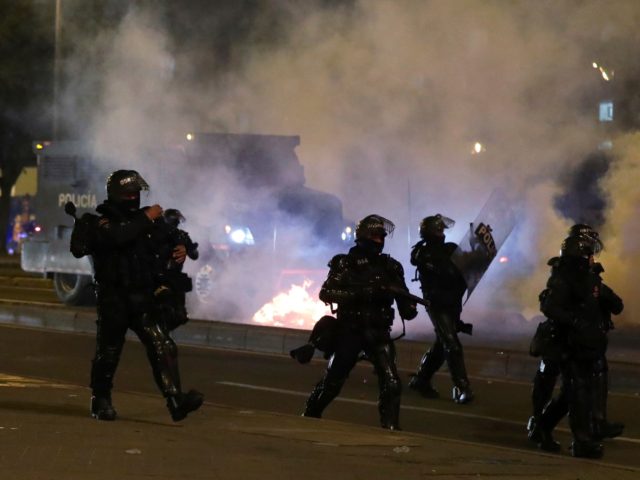A mob of “hooded vandals” burned down the Palace of Justice, a courthouse and government office building, the Tuluá, western Colombia, on Tuesday.
The Palace of Justice was one of the most significant historic sites in the city and a feat of Greek-style architecture, part of the department (regional division) of Valle del Cauca. The building, erected in 1928, took ten years to complete.
Valle del Cauca and its capital, Cali, have been the center of radical leftist riots and violence in the country since the beginning of a “national strike” in late April against self-proclaimed conservative President Iván Duque. While protesters initially claimed the strike was meant to protest a proposed progressive tax increase by Duque, the president retired his proposal three days into the strike, eliminating its purpose.
Since Duque tabled his tax proposal, far-left rioters have continued the “national strike,” largely consisting of road blockades, firebomb terrorist attacks on police stations, highway robberies of medical supply trucks, business and residential looting, and other acts of vandalism. Rioters are demanding Duque’s resignation along with several other vaguely worded reforms unrelated to the original purpose of the strike, such as a universal basic income and an end to “gender discrimination” in society.
Tuesday’s destruction of the Palace of Justice of Tuluá is among the most dramatic scenes to emerge from the ongoing “national strike” since its inception.
Ocurrió en una URI en Popayán, también en la casa de justicia en La Plata. Ahora pasa en Tuluá. Los vándalos quieren obstruir la justicia con quemas como la de esta noche del Palacio de Justicia en Tuluá. Infame que lo celebren. Los responsables van a conocer el peso de la Ley. pic.twitter.com/eP8vq5qTnU
— Diego Molano Aponte (@Diego_Molano) May 26, 2021
#LoÚltimo | Incendian el Palacio de Justicia de Tuluá, Valle.
Se reportan diferentes alteraciones de orden público en el centro del municipio y enfrentamientos – https://t.co/joKAdVZJRR pic.twitter.com/xtexSkPVvT
— Noticias Caracol (@NoticiasCaracol) May 26, 2021
Colombian news outlets reported, citing local law enforcement and eyewitnesses, that the fire appeared to be an act of arson by a group of unidentified “hooded vandals” beginning around 7:30 p.m. local time. As of Wednesday morning, the fire appears to have consumed the entire building, leaving it largely irreparable. The damaged sustained was significant, the Colombian magazine Semana reported, in part because illegal “national strike” roadblocks prevented firefighters from arriving at the scene in a timely manner. At press time, police have not identified the vandals and as such not formally linked them to the leftist movement.
According to a source from Tuluá’s Firefighter Corps speaking to Semana on Tuesday night as the fire raged, “because of the public order problem in the sector, the situation is a bit complicated, so we haven’t been able to go and do our firefighting job to put out the structural flames.” At the time, the source said firefighters could only conduct an “initial valuation” of the scope of the fire from afar.
Colombia’s RCN News noted that, prior to initial reports that the judicial building was on fire, locals began reporting widespread looting of businesses in Tuluá and destruction and vandalism of sites throughout the city. RCN also confirmed the Semana report stating that rioters were actively blocking firefighters from the Palace of Justice to ensure its total destruction.
Speaking to RCN, historian Omar Franco Duque described the destruction as an incalculable cultural loss for the region.
“It was the headquarters of the Pacific Gymnasium, which was a cloister that predicated humanism for all Colombia with people who reached high levels of public office in the country,” Franco explained. “The school was part of a series of cloisters called ‘model colleges’ constructed with money from the sale of the Panama Canal.”
Prior to its destruction, the building largely served as a government judicial office building.
Colombian government officials issued stern condemnations of the attack and vowed to bring those responsible to justice.
“I reject and condemn these acts of terrorism that seek to sow chaos and fear,” Justice Minister Wilson Ruiz said in a statement following the burning. “Attacks like those tonight in Tuluá are not just vandalism but acts of terrorism. Peaceful protest is legitimate, violence is a crime.”
Ruiz has yet to elaborate at press time on how, or if, Colombia’s body of terrorism would apply in the current case.
Minister of the Interior Daniel Palacios also issued a statement condemning those who would excuse the burning of the historic site as a legitimate expression of disapproval with the current government.
“There will surely be some who will justify burning down the headquarters of the Palace of Justice of Tuluá. This is an act of delinquency, without explanation, without mitigation, without special consideration, nor differential treatment,” Palacio said in a statement on Twitter. “Those responsible should be tried and condemned.”
The attack in Tuluá followed a peaceful protest Tuesday attracting thousands of people in Cali, the regional capital, against not the government, but the “national strike.” The event, titled the “March of Silence” in reference to the silent, decent citizens of Colombia opposing leftist violence, specifically demanded that strike organizers lift illegal roadblocks and allow people to go to work and stores to restock basic food items and other necessities. Cali has suffered a streak of some of the worse shortages of food and medicine in the country in recent memory as a result of attacks on supply trucks by leftists.

COMMENTS
Please let us know if you're having issues with commenting.